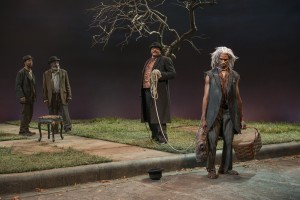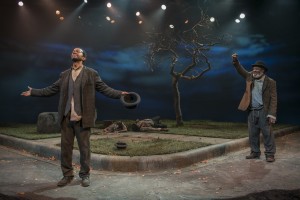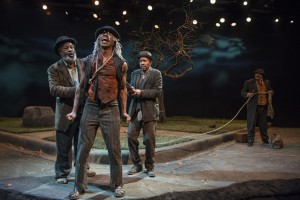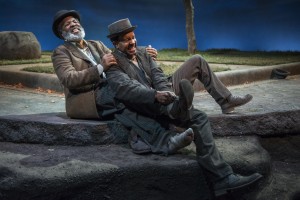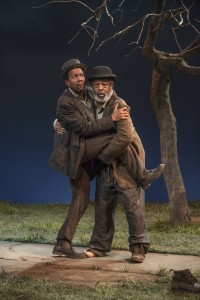BECKETT’S RIDDLE CONTINUES TO CONFOUND
Samuel Beckett’s Waiting for Godot is not an easy play to write about, let alone produce, act, or even watch. It’s challenging, opaque, and ambiguous. On the surface, it’s about nothing at all. Deep down, however, it’s about everything. It carries a multiplicity of meanings that accumulate like the rings on a tree or sand in an hourglass. There are religious, political, psychological, and sociological interpretations, allegorical and autobiographical interpretations’”even homoerotic interpretations. In a sense, they’re all valid ways of reading Waiting for Godot. Yet, none of these interpretations, singly or collectively, exhausts the play’s potential.
Originally written in French and titled En Attendant Godot, the play premiered in 1953. Following Beckett’s own translation into English, Waiting for Godot received a 1955 premiere in London. During Beckett’s lifetime he particularly insisted that the play not be made into a movie or be performed by an all-female cast. All-black casts, however, were okay. One performed Waiting for Godot on Broadway in 1957. Thus, there is nothing especially novel about the current production at Court Theatre, though the all-black cast does enable new readings in light of recent events.
Director Ron OJ Parson gives us a relatively conventional’”one might even say traditional or classical’”production of Waiting for Godot. There’s certainly nothing gimmicky, iconoclastic or shocking in its performance. There’s basically two men, Vladimir (Allen Gilmore) and Estragon (Alfred H. Wilson), waiting by the side of the road for someone named Godot. They’re occasionally interrupted, first by Pozzo (A.C. Smith) and Lucky (Anthony Lee Irons), then by an unnamed boy (Alex Henderson, who alternates with Oscar Vasquez III). Otherwise not much happens. As if to underscore the absurdity, the tedium, and the inanity of it all, both acts are nearly identical. One gets the impression that one day for Vladimir and Estragon is much like any other day.
The staging is simple and realistic: a bare tree, a rock, some grass, a road, and lots of empty sky. There’s nothing to distract the audience from the (in)action of the play. The acting is uniformly excellent. Each has filled Beckett’s sparely-drawn characters with life and personality. Gilmore brings plenty of welcome humor to his role, especially via non-verbal means. Wilson, by contrast, plays up the world-weariness of Estragon’s opposite number. Although at first an interesting diversion, Smith’s Pozzo soon proves to be such an extraordinarily obnoxious and overbearing character that one can’t anticipate his exit soon enough.
Despite the rather excellent performances and Beckett’s intriguing dialogue, Court Theatre’s production of Waiting for Godot is missing something’”maybe not much, but something vital. Occasionally, the pacing is off; the dialogue could have been hurried along and the slapstick tightened up. It’s quite easy to nod off briefly, as Estragon does, or think the play’s over after the first half, as some in the audience did. Yes, it’s a demanding play that asks questions it doesn’t even attempt to answer’”Godot is whatever the spectator wants him, or it, to be’”but I wasn’t convinced the men on stage had created for themselves the simple answers to the questions, “Who is Godot?” and “Why are we waiting for him?”
Waiting for Godot
Court Theatre, 5535 S. Ellis Ave.
Wed and Thurs at 7:30; Fri at 8;
Sat at 3 & 8; Sun at 2:30 & 7:30
ends on February 15, 2015
for tickets, call 773.753.4472
or visit www.CourtTheatre.org
for info on Chicago Theater,
visit www.TheatreinChicago.com

